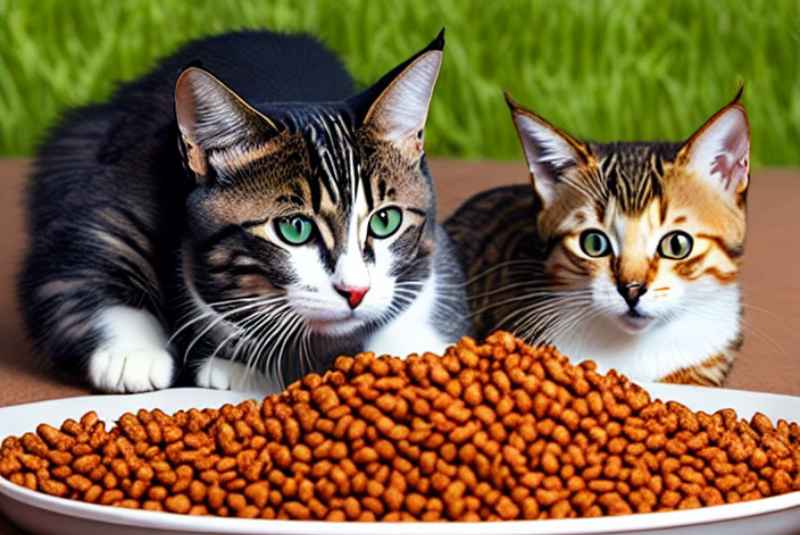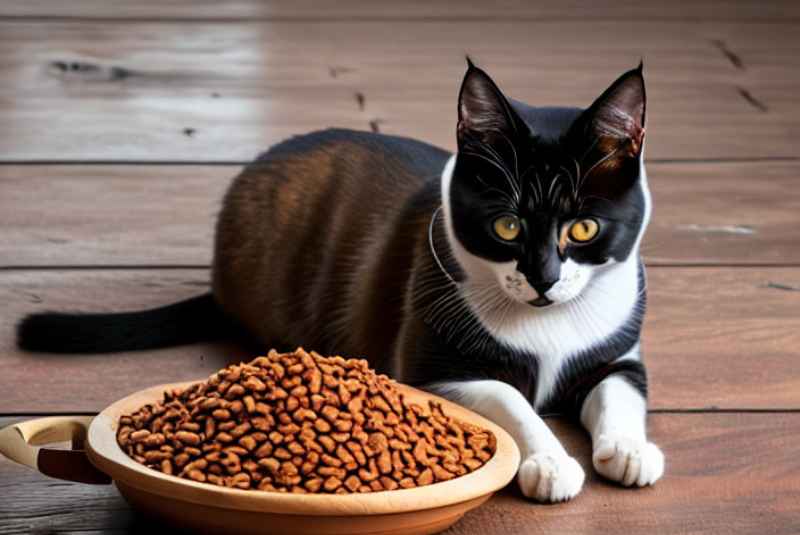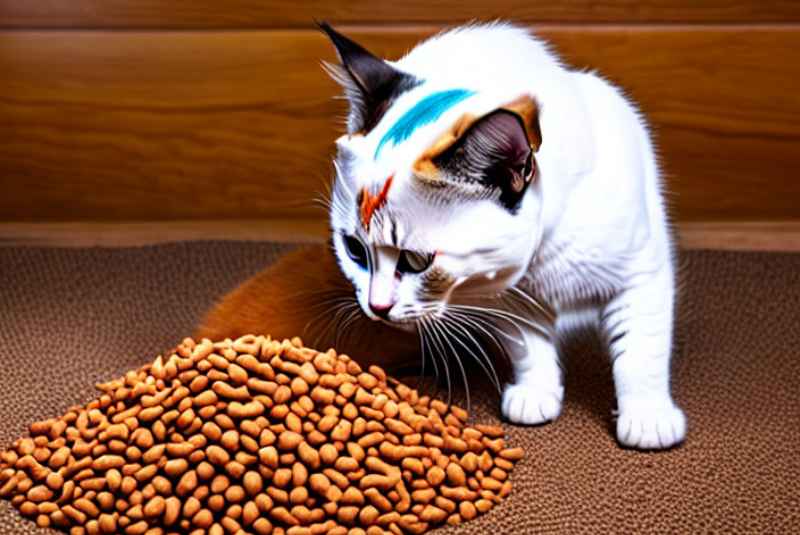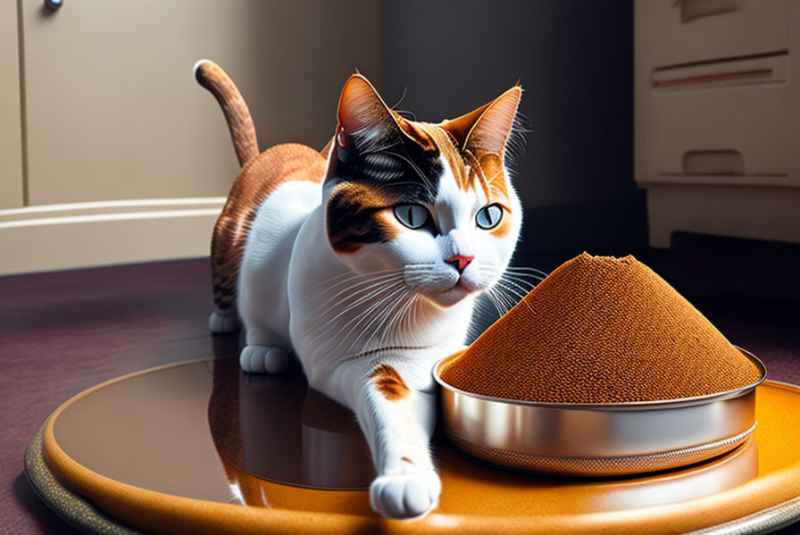For pet owners, “Why Cats Urinate in Dog Food?” can be a confusing question. Determining the underlying causes of this behavior is essential to devising workable solutions. In this piece, we’ll examine the intricacies of feline behavior, investigate the causes of this strange habit, and offer helpful advice on how to stop it.
Understanding Cat Behavior
Cats are naturally territorial beings. They frequently use different techniques, such as urinating, to mark their territory. These kinds of behaviors can become more noticeable in a home with multiple pets.
Factors Leading to Why Cats Urinate in Dog Food?
- Stress and Anxiety
When cats are nervous or stressed, they may take to urinating in dog food. This behavior may be brought on by new pets, changes in the home, or interruptions in the routine.
- Medical Issues
Inappropriate urination may be caused by underlying medical conditions like kidney disease or urinary tract infections. It is imperative to exclude health issues with a veterinarian’s examination.
- Behavioral Problems
Unresolved behavioral problems, like disagreements with other animals or boredom, may lead cats to look for different locations to relieve themselves.
Read This Also: Can You Feed a Ferret Dog Food?
Preventing Why Cats Urinate in Dog Food?
1. Separate Feeding Areas
To reduce territorial disputes, give cats and dogs separate areas to eat. This contributes to a stress-free atmosphere at mealtimes.
2. Provide Individual Feeding Bowls
Give each pet a separate feeding bowl. As a result, there is less rivalry for resources and less chance of territorial marking.
3. Monitor Feeding Times
Set up a regular feeding schedule and keep an eye on your pets while they eat. This helps to maintain a healthy routine and also stops unintentional urination.
Creating a Comfortable Environment

- Provide a Stress-Free Zone
Make a tranquil, safe haven where your cat can go to unwind after a stressful day. Hideout locations, comfortable bedding, and little disturbances can help achieve this.
- Use Pheromone Diffusers
Use diffusers with pheromones that release relaxing aromas. These can contribute to a less stressful and more laid-back atmosphere in the home.
Regular Veterinary Check-ups
1. Importance of Routine Health Checks
Plan on seeing your veterinarian on a regular basis to make sure your cat is healthy overall. Inappropriate urination can be avoided by detecting medical problems early on.
2. Identifying and Addressing Health Issues
Contact a veterinarian right away if your cat is acting strangely. Maintaining the health of your pet depends on taking timely care of health issues.
Proper Nutrition for Cats
- Meeting Dietary Needs
Make sure your cat eats a balanced diet to meet their nutritional needs. Excellent Why Cats Urinate in Dog Food? created to address particular health issues can be advantageous.
- Specialized Cat Food Options
Investigate specialized services designed to handle stress or urological problems. These could aid in the management of behavioral issues that lead to inappropriate urination.
Training and Positive Reinforcement
1. Reinforcing Proper Behavior
Provide constructive criticism to promote proper conduct. Why Cats Urinate in Dog Food? for using the assigned litter box and gently discouraging inappropriate behavior.
2. Discouraging Inappropriate Actions
Retaliatory actions should be avoided since they can increase stress and aggravate behavioral issues. Redirecting and rewarding positive behavior should be the main focus instead.
Cleaning and Maintaining Hygiene
- Regular Cleaning of Feeding Areas
Maintaining clean feeding areas will deter inappropriate urination. Strong urine odors make cats more likely to avoid those areas.
- Proper Waste Disposal
Keep things hygienic and dispose of waste appropriately. In addition to stopping undesirable behavior, this protects your pets’ health and wellbeing.
Read This Also: How to Open a Dog Food Bag?
Common Mistakes to Avoid
1. Ignoring Behavioral Changes
Keep an eye out for modifications to Why Cats Urinate in Dog Food? Ignoring small clues can cause bigger problems later on, like untimely urination.
2. Using Punishment as a Solution
Cat punishment for inappropriate urination can exacerbate anxiety and stress. Prioritize providing positive reinforcement and tackling the underlying reasons behind the behavior.
Alternative Solutions

- Cat-Friendly Feeding Zones
Set aside specific spaces so your cat can eat in comfort. This could be a peaceful room or a quiet corner where they can eat in peace and quiet.
- Interactive Feeding Methods
Use interactive feeding techniques to keep your cat interested and active during meals, such as using toys or puzzle feeders.
Case Studies
Examine actual case studies of pet owners who successfully addressed and resolved their cats’ inappropriate urination issues.
Community Insights
Learn important lessons and advice from other cat owners’ experiences who have effectively handled and prevented Why Cats Urinate in Dog Food?
Additional Tips for Preventing Inappropriate Urination
1. Interactive Feeding Methods (continued)
Investigate interactive feeding techniques that will entertain your cat and pique their innate hunting desire. You can divert your cat’s attention from the dog’s food during mealtime by using puzzle feeders and treat-dispensing toys.
2. Environmental Enrichment
To improve your cat’s environment, consider including window perches, climbing frames, and scratching posts. These opportunities for both physical and mental stimulation can help people feel less stressed and discouraged from marking their territory.
3. Multi-Cat Household Dynamics
It’s important to comprehend the social dynamics in homes with several cats. Make sure every cat has a designated space, a litter box, and a place to eat. Stress-related behaviors can be avoided by promptly resolving disputes between cats.
Advanced Behavioral Solutions
- Consultation with a Veterinary Behaviorist
Consult a veterinary behaviorist for advice on persistent behavioral problems. These experts provide specialized solutions for challenging situations by comprehending and altering animal behavior.
- Behavior-Modifying Medications
In severe situations, your veterinarian may suggest taking behavior-modifying drugs to treat stress or anxiety. These ought to be utilized in conjunction with behavior training and only under the supervision of a professional.
Proactive Health Measures
1. Dental Care for Cats
In cats, dental disease can exacerbate stress and discomfort. Frequent dental care, such as brushing and dental treats, can have a positive behavioral impact in addition to supporting general well-being.
2. Weight Management
A cat’s health depends on maintaining a healthy weight. To make sure your cat’s diet is suitable for their age, size, and health, speak with your veterinarian.
Expert Insights
- Veterinarian Dr. Anderson’s Advice:
The amount of inappropriate urine your cat urinates can be greatly decreased by being aware of their unique needs and creating a stimulating environment. A healthy diet, mental stimulation, and routine vet exams all help create a happy, well-mannered cat.”
- Animal Behaviorist Prof. Johnson’s Perspective:
“When dealing with territorial behavior in multiped households, a combination of environmental modifications and positive reinforcement is needed. Because cats are creatures of habit, keeping a regular routine is essential to avoiding stress-related problems.”
Read More Discussion On Quora: Why is our cat peeing in the dog’s food bowl?
Case Studies (continued)
Case Study 1: The Curious Kitten
Meet Max, a lively kitten who, not long after moving into a home with a dog, began to urinate in the dog’s food bowl. Max’s comfortable nook and separate feeding areas were the owners’ successful strategies for ending this behavior. This case highlights how crucial it is to identify younger cats’ territorial instincts.
Case Study 2: The Senior Cat’s Adjustment
In a different case, the introduction of a new dog caused an older cat named Whiskers to start exhibiting stress-related urination. The owners successfully facilitated Whiskers’ transition by establishing a stress-free zone and adding pheromone diffusers, demonstrating the value of making environmental changes.
Community Insights (continued)

- Tip from Cat Owner Sarah:
“My cat’s urge to mark territory was lessened when I placed a scratching post close to the feeding area. Since then, he hasn’t touched the dog’s food, which has changed the game.”
- Advice from Experienced Pet Owner Mike:
The secret is consistency. Maintain a schedule, and your pets will feel safe. My cat’s anxiety-related urination problems around the dog’s feeding time were greatly alleviated by this.
Conclusion
In above, we discussion Why Cats Urinate in Dog Food? is necessary for a resolution that works. Dogs and cats can live in harmony when their pet owners take care of things like stress, health concerns, and behavioral issues.
Can changes in the household trigger urination issues in cats?
Yes, significant changes, such as moving or introducing new pets, can contribute to stress-related behaviors. Gradual introductions and maintaining a stable environment can help.
Is there a specific age when cats are more prone to marking territory?
Territorial instincts can manifest at any age, but it’s often more noticeable during times of change or when introducing new pets.
What role does playtime and mental stimulation play in preventing such behaviors?
Engaging your cat in regular play and providing mental stimulation can reduce stress and boredom, contributing to better behavioral outcomes.
Are there home remedies for reducing stress in cats?
While environmental adjustments and positive reinforcement are crucial, some owners find success with herbal remedies or calming pheromone sprays. Consult with your vet for recommendations.
Can professional behavior training help if my cat’s urination issues persist?
Absolutely. Seeking guidance from a professional animal behaviorist can provide tailored strategies to address persistent behavioral problems.

1 thought on “Why Cats Urinate in Dog Food? Full Discussion”